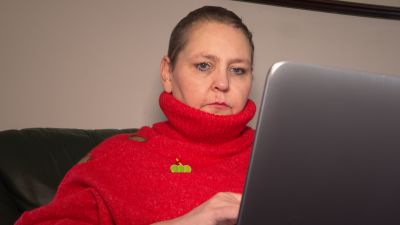Contaminated blood victim from Norfolk says £100k compensation from government is not justice

A woman who says she was given a "death sentence" after contracting hepatitis C from contaminated blood says the Government's £100,000 compensation offer will not bring justice for victims.
Michelle Tolley, 57, from Sparham in Norfolk, received two blood transfusions between 1987 and 1991, but did not learn of her hepatitis diagnosis until 2015.
She is one of thousands of NHS patients who were given infected blood during the 1970s and 80s.
The government has announced an interim payment of £100,000 for some victims of the scandal, but campaigners say they need accountability for what happened.
Mrs Tolley said: "For me and my 35 years [since being infected] - divide 35 years into £100,000 and it doesn't really equate to very much.
"So it's a good gesture by the government. It's a very long time coming, it's a good acknowledgement.
"Now we need accountability, we need justice, we need closure to be able to move on with whatever we have left of our lives.
"Lots of us have been left with health issues that will take years off of our life.
"I don't know if I'll still be alive at the end, once the full compensation is sorted out. I don't know.
"I've seen friends die, I've been to their funerals, and you think to yourself, which one of us is next? We don't know and we live with that every day.
"I've always said that I was given a death sentence for actually committing no crime."
The government said it intended to make payments to those who have been infected and bereaved partners in England by the end of October.
Campaigners said the announcement failed to recognise most family members affected by the scandal, who will miss out on this raft of interim payments.
Chris Smith, from Cambridgeshire, whose father Raymond died of HIV Aids contracted from contaminated blood said parents and children had been "forgotten".
Mr Smith said: "Some of these parents are left feeling guilty because they were the ones giving the kids the injection, so they feel like they killed their own kids.
"And then the kids themselves that actually sat and watched their parents die in front of them with no explanation to why it happened or what happened.
"So we do feel a little bit forgotten at the moment, but this is the best forward steps we've seen in the past 35 years
"I think justice comes before compensation, in my eyes. This is the biggest treatment disaster in NHS history that pretty much no one really knew about until this public inquiry came about.
"So many people were infected, have died, lives ruined and there is still at this point no accountability."
Want a quick and expert briefing on the biggest news stories? Listen to our latest podcasts to find out What You Need To Know